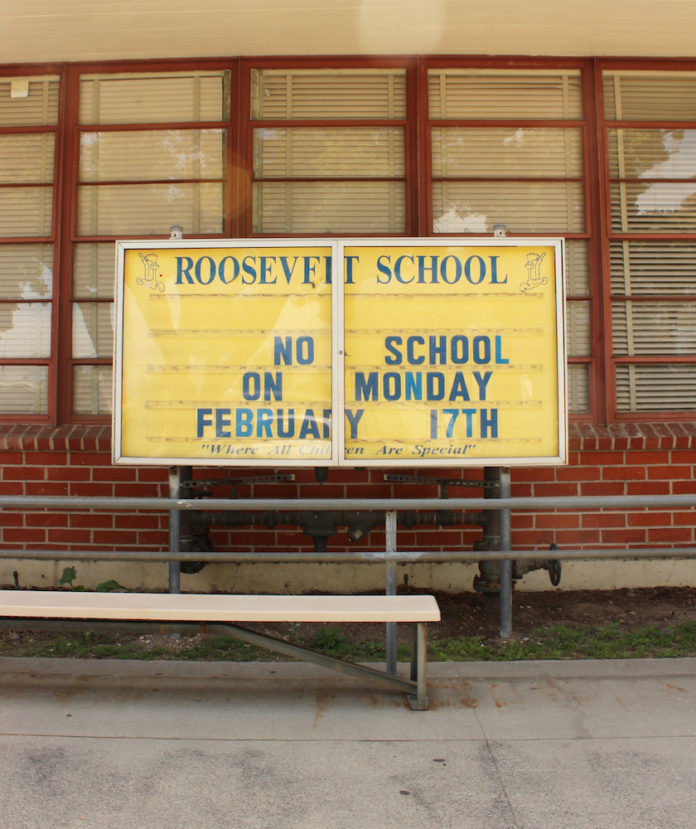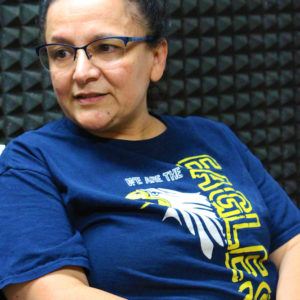
Parents of Roosevelt Elementary School are preparing a recall campaign for Pasadena Unified School District (PUSD) vice president and board member Scott Phelps, amid opposition to the board’s decision to close Roosevelt at the end of the 2019–2020 school year along with Jefferson and Franklin Elementary Schools. This is the fourth round of school closures in PUSD since since 2005 due to consistently falling enrollment and decreasing budgets. Jefferson students will be moved to Longfellow Elementary School, Franklin students moved to Altadena Elementary School and Roosevelt students moved to Madison Elementary School. Roosevelt, which falls under Phelps’ District 7, is the school district’s only school specifically built to accommodate special needs students’ accessibility and academics, according to Patricia Guzman, a Madison teachers union representative and a transitional kindergarten teacher.
Rene Gonzalez is a Roosevelt parent, father of five and the leader of the recall campaign. All of Gonzalez’s children went to Roosevelt, and two are currently enrolled. Since the board approved the closures by a vote of 4–3 Sept. 26, 2019, Gonzalez has been amassing parent efforts from both Roosevelt and Madison to reverse the action — creating the Parent Advisory Committee and the activism group “Padres.” Gonzalez also opened a civil rights case with the U.S. Department of Education, and the Mexican American Legal Defense and Educational Fund (MALDEF) has also begun an investigation.
“[Parents] are united,” Gonzalez said. “We’re going to wait until the U.S. Department of Education completes the lawsuit [and] investigation. We’re really hoping that we win.”

According to a 2019–2020 California Longitudinal Pupil Achievement Data System student enrollment report, 30 percent of Roosevelt students require special education and almost 90 percent are socioeconomically disadvantaged. Gonzalez said most of the Roosevelt parents have work shifts that begin early in the morning, and moving to a public school further away would interfere with their ability to bring children to school and arrive to work on time. Gonzalez said they would not be able to afford a private school education as an alternative.
“You don’t disrupt the socioeconomic disadvantaged people, you leave them alone,” Gonzalez said. “The socioeconomic disadvantaged people are the ones that will have the biggest impact.”
Guzman, who teaches at a free public school program for 4 year olds who turn 5 between Sept. 2 and Dec. 2, said Madison is not currently equipped to accommodate special needs students from Roosevelt because it lacks appropriate infrastructural facilities, professional staff and academic programs. Madison is expected to take in Roosevelt students with moderate to severe learning problems in the coming fall, while those with mild to moderate learning problems are designated to Washington.
“Roosevelt was for special needs kids,” Guzman said. “It has doors that open [automatically] … It’s all leveled. And all the therapists are there, the nurses are there. The school itself was built and has all the equipment and staff that supports the students to learn.”
Guzman said the prospective additional enrollment could potentially aggravate the current traffic problems on the narrow two-way streets surrounding Madison. According to Guzman, a passed PUSD measure to add a drive-through for dropping off students two years ago was never implemented. Guzman said she worries the problem will only get worse after Roosevelt’s closure, with no foreseeable construction plans on Madison.
According to Guzman, while schools across PUSD provide special education, Roosevelt offers the most comprehensive services and accepts special needs students from kindergarten to fifth grade. Guzman said Madison currently only offers special education for preschool students, who will be redistributed to other PUSD schools that offer appropriate programs based on their Individual Education Plan (IEP) meeting and assessment.

The board has suggested open enrollment for parents of closed schools and created an exclusive special lottery system allowing them priority registration before the annual open enrollment. According to Phelps, this allows parents to register for any school in the district they want to go to. Although some parents said they were put on waiting lists despite the system, Gonzalez said around 20 Roosevelt parents have already registered their children at Madison. The board discussed the transportation of students from the closed schools at a Feb. 13 board meeting. Phelps said designated schools are willing to provide transportation, and that he believes parents do have choices in where to send their children.
Also central to Padres’ complaint is the lack of transparency in the board’s decision-making process. According to the California Department of Education’s “Closing a School Best Practices Guide,” the process starts with gathering facts about communities where schools are situated through a District Advisory Committee (DAC) made up of a group of community members with diverse backgrounds. Gonzalez said this never happened, and that there was only a week between when the board notified parents of the closure and the final vote.
“No time for us to prepare. No time for us to advocate. No time for us to call for help,” Gonzalez said. “It was an attack. It was a direct attack on our community.”
Gonzalez said if a thorough evaluation of PUSD schools and their communities had been carried out, Roosevelt would not appear in the list of proposed school closures. In that case, Gonzalez said, he thinks San Rafael Elementary School would be closed instead. San Rafael is the only public school in West Pasadena and also lies within Phelps’ District 7. Phelps said the decision is completely based on procedural considerations, such as San Rafael’s 400-plus enrollment and its signature academic program, the Dual Language Immersion Program.
“Everybody wants you to close someone else’s school,” Phelps said. “I learned a long time ago that in situations involving children, it’s never the parents’ job to be rational, and they’re just going to do whatever for the kids. But the board of education cannot make decisions based on emotion.”
Phelps said the board’s primary reason for closing Roosevelt was due to its low enrollment. Other factors included sustaining socioeconomically integrated classrooms in PUSD schools overall and the integration of special education students into regular classrooms — a decision Phelps said the board made in consultation with PUSD staff.
“It’s not good to have special education students sequestered in their own school,” Phelps said. “That’s not what the law [Individuals with Disabilities Education Act] says. The law says they should be in the least restrictive environment, meaning they should be, as much as possible, integrated with regular students.”
As parents blame school closures on the board’s poor planning, while the board blames decreasing budgets on falling enrollments, Phelps said PUSD’s fiscal difficulties remain a reality.
“Everyone hates this,” Phelps said. “But we have to do this for the good of the district, for being able to use resources in a better way.”
On the other side, Gonzalez is preparing to confront the board about the district’s mapping at the next board meeting Feb. 27. He said the current mapping deprives many Roosevelt parents of power because Phelps is not the same as their district trustee, meaning they cannot vote him out.
“The short-term goal is to fight and fight and fight, not stop, and get a platform and get stronger and stronger,” Gonzalez said. “The recall is my long-term goal.”
![]()






























